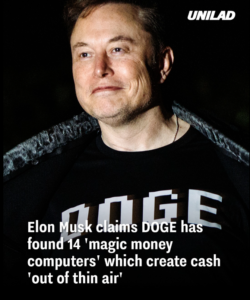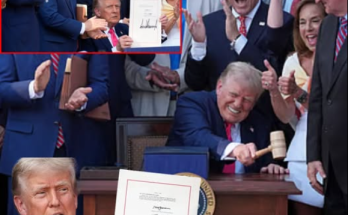Elon Musk, leading the Department of Government Efficiency (DOGE), recently claimed the discovery of 14 “magic money computers” within various U.S. federal agencies. According to Musk, these systems possess the capability to generate funds “out of thin air,” effectively disbursing payments without direct financial backing.
The Concept of “Magic Money Computers”
During a discussion on Senator Ted Cruz’s “Verdict” podcast, Musk introduced the term “magic money computers” to describe these systems. He defined them as computers that “just make money out of thin air,” indicating that they have the authority to issue payments without immediate fiscal constraints. Musk asserted that his team identified 14 such systems across multiple federal departments, including the U.S. Treasury, Health and Human Services, State, and Defense Departments.
Implications for Government Spending
The revelation of these systems has sparked discussions about their impact on government spending and fiscal responsibility. Musk’s assertions suggest that these computers can authorize substantial expenditures autonomously, potentially contributing to inefficiencies or unchecked spending within the federal budget. This aligns with DOGE’s mission to identify and eliminate waste, fraud, and abuse in government operations.
Reactions from Officials and Auditors
The discovery has elicited varied reactions from government officials and auditing professionals. Some experienced federal auditors have expressed concern over DOGE’s methods, characterizing them as chaotic and lacking adherence to standard auditing practices. They argue that such an approach could lead to data breaches and mismanagement rather than effective oversight.
Critiques and Conspiracy Theories
Musk’s claims have also intersected with broader political narratives. He has echoed right-wing conspiracy theories, alleging that entitlement programs like Social Security and Medicare are exploited to attract immigrants and expand certain voting bases. Musk suggests that such fraud has cost the government up to $200 billion, justifying cuts to these programs.
Programs and Personnel
The identification of these “magic money computers” has led to tangible actions within federal agencies. For instance, the charity organization GiveDirectly, which focuses on reducing global poverty through cash transfers, lost $20 million in expected funding due to cuts driven by DOGE. This has affected several initiatives, including support for young entrepreneurs in Mozambique.sonnel cuts have occurred at the Social Security Administration, and new in-person identity checks for recipients have been implemented. These measures aim to curb fraudulent payments but have also raised concerns about their impact on legitimate beneficiaries.
Political Tensions and Public Perception
The actions of DOGE under Musk’s leadership have heightened political tensions. Senator Lisa Murkowski of Alaska has openly criticized DOGE’s measures, despite potential political backlash from Musk’s influential position. She emphasizes her commitment to advocating for her constituents and condemns the widespread silence among her colleagues due to fear of reprisal.
Public opinion on DOGE’s initiatives appears mixed. While some support efforts to reduce government waste, others express concern over the methods employed and their broader implications. Polls indicate that while there is some approval for DOGE’s objectives, negative opinions of Musk personally persist.
Conclusion
Elon Musk’s disclosure of 14 “magic money computers” within federal agencies has ignited debates about government spending, auditing practices, and the balance between efficiency and oversight. As DOGE continues its mission to streamline government operations, the effectiveness and repercussions of its strategies remain subjects of scrutiny and discussion.
